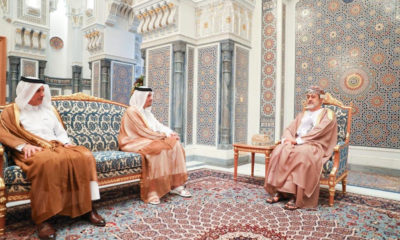
Israel

Is a Saudi-Israel deal imminent?
The Abraham Accords normalising Israel’s relations with the United Arab Emirates (UAE) in September 2020 seemed to come out of the blue. Soon after came normalisation agreements between Israel and Bahrain, Morocco, and Sudan. In reality, these arrangements followed years of clandestine ties and painstaking negotiations.
The big prize for Jerusalem was always a deal with Riyadh, however, without whose acquiescence these others would never have happened. In contrast to the initial quiet around the Abraham Accords, there has been open talk by leaders from Israel, Saudi Arabia, and the United States (US) in recent weeks suggesting that an agreement is only weeks or months away. We look at what’s at stake for all sides.
At the United Nations General Assembly last month, Israeli Prime Minister Benjamin Netanyahu said that Israel and Saudi Arabia were “on the cusp” of an agreement. This followed similar sentiments by Mohammed bin Salman, the Crown Prince of Saudia Arabia and the country’s de facto leader. The US has also confirmed that talks are advanced, teetering on the brink of a breakthrough.
The symbolism and substance of an Israeli-Saudi rapprochement would be enormous for Israel. It would profoundly change the dynamics of the Middle East, and show that the Palestinians no longer hold a veto over Israel’s ties with Arab states.
Saudi Arabia is home to Islam’s holiest cities of Mecca and Medina, and has a market of 36 million people, with a gross domestic product per capita of $23 000 (R443 839). It’s the world’s 18th largest economy, at just more than $1 trillion. It produces nine million barrels of oil per day, as the world’s third largest producer. All this makes it an attractive trading partner for Israel in the region. As a trust-building measure, Israeli aircraft have been allowed to use Saudi airspace since August 2022. A deal would be a feather in Netanyahu’s cap, and a foreign policy win.
However, in March 2023, a Chinese-brokered deal to restore diplomatic relations between Saudi Arabia and Iran – Israel’s archfoe – seemed to make any hope of a Saudi-Israeli agreement remote. The plan to expand the Abraham Accords also appeared to run out of steam when Donald Trump relinquished the White House. Now, the Joe Biden administration is scrambling to regain geopolitical influence in the Middle East, where China has been making serious economic and diplomatic inroads. An Israeli-Saudi peace deal would bolster Biden’s re-election bid in 2024 and help to outflank China.
The Saudis are said to have two key demands from the US: a military protection agreement, and assistance with developing peaceful-use nuclear technology. The first would stop short of an agreement like the North Atlantic Treaty Organization, in which an attack on one is considered an attack on all, and could look more like the looser but still significant military support that the US provides for Japan and South Korea. The second would require firm guarantees that the Saudis weren’t seeking to develop nuclear weapons. There has also been talk of the Saudis seeking to acquire sophisticated US arms. Time will tell whether the US wants to meet these demands – some may face considerable opposition in Congress. The Saudis’ poor record on human rights could also be an important factor.
And what about the Palestinians and the “two-state solution” to the Israel-Palestinian conflict? Since 1967, the standard operating procedure in the Arab and Muslim world was no peace with or recognition of Israel until the establishment of a fully-fledged Palestinian state. This stance was eroded by Israeli peace deals with Egypt in 1978 and Jordan in 1994, and then shattered in 2020 by the Abraham Accords with the four Muslim-majority countries – Bahrain, Morocco, Sudan, and the UAE. The Saudis have made it clear that any deal with Israel won’t be held hostage by the Palestinians, in spite of the Saudi peace plan launched in 2002. But they would surely want to show some progress in tangibly improving the lives of the Palestinians and setting the moribund negotiations for a “two-state solution” back on track.
The Saudis are also said to want some power over the Temple Mount in Jerusalem, surely the most volatile and sensitive patch of land in the world. This could create tensions with Jordan, which holds influence over the mosques and religious buildings there through the waqf (a religious council). These and any further concessions by Israel may, however, prove fatal to Netanyahu’s right-wing coalition government.
If there is any doubt that these deals make a difference, the embassy of the UAE to Israel tweeted – or is it ‘x’ed? – the following numbers. Bilateral trade with Israel reached $5.6 billion in three years. Commercial flights went from zero to 106 per week. More than a million Israelis have visited Dubai and the rest of the country. More than 70 Israeli companies operate in the UAE; more than 120 agreements and memoranda of understanding have been signed; and Israel and the UAE have a bilateral trade deal. More balance is needed, for sure, to increase UAE investment in and visits to Israel.
If an acceptable agreement can be struck with Saudi Arabia, it would alter the Middle East dramatically. It will require compromises, but it will bring countries opposing Iran closer together. The dream of Israel living in peace with all its neighbours would be one step closer. Outright rejection of the Abraham Accords did little to assist the Palestinians’ cause. They are now looking at ways to squeeze maximum concessions from any deals reached. And unless they want to be left behind, again, the Palestinians need to adjust to the new realities of the region.
- Steven Gruzd is a political analyst at the South African Institute of International Affairs in Johannesburg. He writes in his personal capacity.










